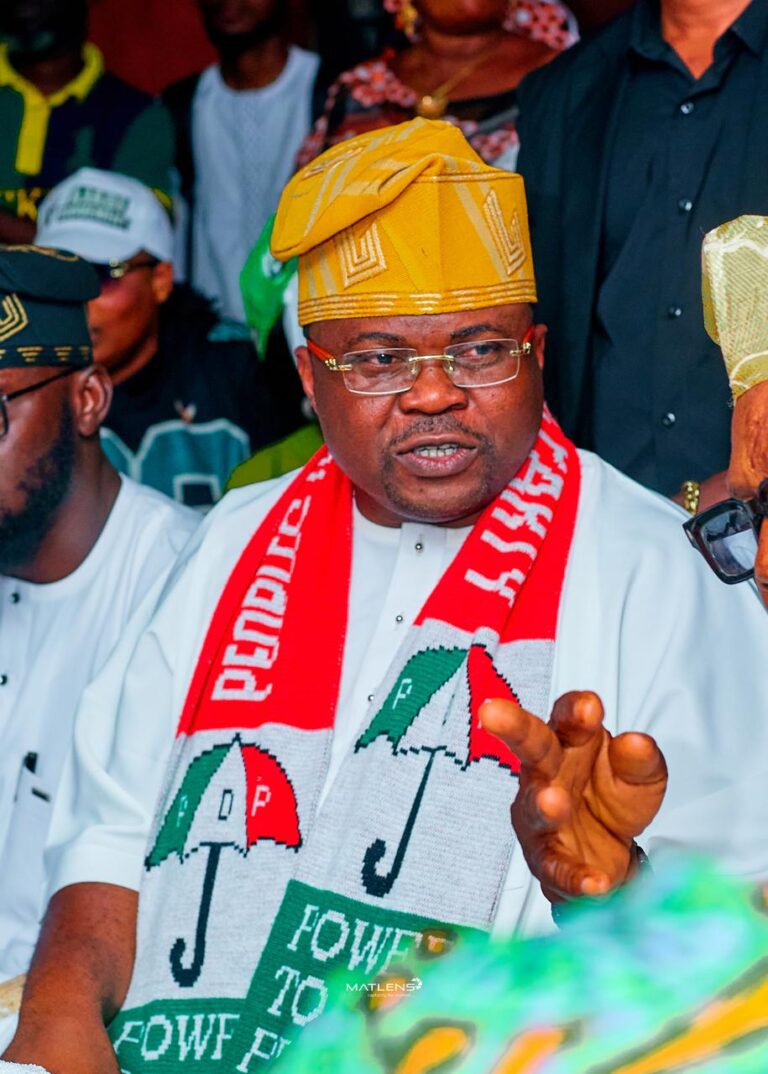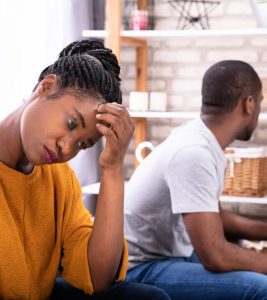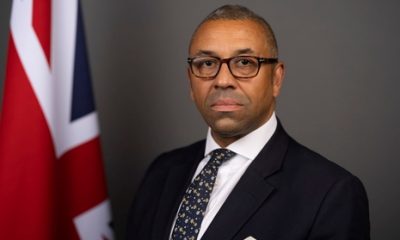society
7 Reasons Nigerian Marriages Are Crashing In The UK

7 Reasons Nigerian Marriages Are Crashing In The UK
Nigerian Marriages always appear solid and formidable until the union gets a visa. The moment it passes through the UK Point of Entry, it starts to develop cracks until it takes more falls than the Naira under the current Tinubu administration. In this piece, I will be taking a dive into the common reasons why Nigerian marriages struggle on UK soil.
(1). Personal Vendetta:
Marriage as an institution in Nigeria is modeled around patriarchy – a system of male dominance. In this case, the man is the king while the woman is the queen. As you know, the king dominates the queen, and nothing he does is wrong in most cases (especially for the wealthy men). The woman could be forced to endure physical, verbal, psychological, financial abuse, and lots more. She stands to get mocked if her marriage crashes. This creates age-long bitterness and a cold war in the union. Women have a long memory and they hardly forgive. The moment the marriage transits to a society that gives women an upper hand against men, they come for their pound of flesh like Shylock. This destroys the foundation and subsequently brings it to an end.
(2). Level Playing field:
Marriage in Nigeria is a bit lopsided in terms of the professional profiles of the couples. In some cases, the husband might be a doctor while the wife might be selling beauty products or other petty items that cannot sustain her financially. The man steps in, and this gives him an undue edge in the marriage. In the UK where a hard-working bartender can match a nurse financially, and there is a level playing ground, power changes hands. The man who might be an alpha male loses that edge. This kind of equality – an unfamiliar territory for the man, if not well-managed might be the collapse of the marriage.
(3). Cultural Issues:
In the UK, the difference between a man and a woman might be that one menstruates and the other doesn’t. In fact, people switch genders according to their moods. In simple terms, there is no duty/responsibility that is totally exclusive to a man or woman. Over here, men go to the market, clean, wash, cook, babysit, run errands, and also fund the home. Local champions who are used to being served like emperors by their wives might struggle to cope with the new environment and could feel short-changed.
(4). Busy Schedules:
It is no longer news that the cost of living in the UK is as high as a COVID-19 patient’s temperature. In my previous articles, I have overemphasized how people inevitably work for long hours in order to cope with rising living expenses and financial demands from their families back home. This might affect bonding between young couples and reduce intimacy. Most times, when one party is ready for a “mid-section parley”, the other might be unavailable due to conflicting shift patterns, not being in the mood due to mental or physical stress. This gradually takes a negative toll on the marriage.
(5). Women Are Powerful Abroad:
In the West, there are checks to prevent the domination of women by men. This has made women so powerful. In the event of a conflict, the odds are always against the men. The Spanish FA chief, Luis Rubiales learned the hard way for controversially kissing midfielder, Jennifer Hermoso at the recently concluded 2023 Women’s World Cup. Also in February 2021, Yoshiro Mori – head of the Tokyo 2020 Olympic Games Organising Committee, was coerced into resigning after saying ‘women talk too much in meetings’. Former Manchester United player, Mason Greenwood apparently ruined his career due to struggles with his partner. In marriage, some women mischievously abuse their powers. A colleague lost his marriage of 5 years after his wife reportedly abused him physically multiple times. A behaviour that was never evident in Nigeria according to him.
(6). Cheating:
A randy man who is obsessed with beautiful women would easily make mistakes in the UK. The UK exposes you to numerous women of different shapes, forms, and beauty. If you think you have seen it all, you need to see the Jamaican, Somalian, Pakistani, Iranian, curvy Kenyans, and some pretty Indian women. It is not just how they look alone but what they are wearing. Some of them might fancy you and might be willing to hand you the cookie on a platter of gold. There are also several single mothers who have nothing to lose. They are ready to ‘share it’ graciously like the Federal Government palliatives across their community. One person’s husband might be hooked to the detriment of his marriage.
(7). Finances:
Another area of challenge in a UK home is money. In an informal survey I personally conducted, I realized it is the most common problem around. It is extremely difficult for a man to singlehandedly foot the household bills in the UK. Paying for everything is easily obtainable in Nigeria where the cost of living is lower. A woman who is used to the Nigerian system might be hoarding cash, and under-declaring her finances. This is done to force the man to fill the vacuum. This creates discontentment, and over time, frustration starts to hit the man. He might be tempted to seek solace outside the marriage to boost his mental health.
Osahon George Osayimwen is a Journalist and a Developmental Psychologist. He writes from the South Yorkshire region of England.
news
GEN CHRISTOPHER GWABIN MUSA SUPPORT INITIATIVE COMMENDS STATE-FEDERAL COLLABORATION IN ZAMFARA

GEN CHRISTOPHER GWABIN MUSA SUPPORT INITIATIVE COMMENDS STATE-FEDERAL COLLABORATION IN ZAMFARA
The Gen Christopher Gwabin Musa Support Initiative (GCGMSI) has commended the Zamfara State Government for its decisive contribution to security operations through the donation of newly acquired armoured personnel carriers (APCs), surveillance drones, and other critical operational equipment to troops and security agencies in the state.
This commendation was contained in a statement signed by the Convener of the GCGMSI, Ibrahim Dahiru Danfulani, Sadaukin Garkuwan Keffi/Betara Biu, and made available to the press.
The equipment was formally commissioned on Wednesday, February 18, by the Grand Patron of the GCGMSI and Minister of Defence, General Christopher Gwabin Musa, OFR (rtd.), in a ceremony at the Government House, Gusau. The event was attended by senior military officers, heads of security agencies, and top officials of the Zamfara State Government.
The GCGMSI, in its statement, hailed the donation as a “transformative and timely intervention” that aligns perfectly with its core objective of advocating for and supporting tangible measures that enhance the operational capacity and welfare of Nigeria’s security forces. The Initiative praised Governor Dauda Lawal’s administration for moving beyond rhetoric to actionable, material support, describing the move as a “blueprint for state-level collaboration in national security.”
“The provision of these assets by the Zamfara State Government is a testament to visionary leadership and a profound commitment to the peace and stability of its people,” the GCGMSI statement read. “It represents the exact kind of synergistic partnership between state and federal authorities that the GCGMSI champions. This initiative will significantly close operational gaps, boost the confidence of our gallant troops, and send a strong message to criminal elements.”
Speaking at the commissioning, General Musa emphasized that sustained collaboration is indispensable in confronting the nation’s evolving security challenges. He specifically commended Governor Lawal for his proactive support.
“Governor Dauda Lawal has demonstrated exemplary leadership and an unwavering dedication to the security of Zamfara State,” the Defence Minister stated. “The provision of these armoured vehicles, surveillance drones, and other operational equipment will undoubtedly boost the morale and operational effectiveness of our troops and other security agencies on the ground. This is a commendable effort that should be emulated by others.”
The newly commissioned assets, which include multiple APCs and advanced surveillance drones, are expected to dramatically enhance the mobility, protection, intelligence-gathering, and rapid response capabilities of security forces, particularly in the state’s remote and difficult terrains where anti-banditry operations are ongoing.
In his remarks, Governor Lawal reiterated his administration’s steadfast commitment to being a reliable partner in the security architecture. He urged security agencies to deploy the new resources responsibly and effectively to safeguard lives and property.
The Federal Government, through the Ministry of Defence, reaffirmed its commitment to continuing and deepening such partnerships with state governments across the nation to strengthen coordination and resource allocation in the collective fight against insecurity.
The GCGMSI concluded its statement by urging other state governments to take a cue from Zamfara’s “bold and pragmatic” approach, affirming that such concrete support is vital for achieving lasting peace and security across Nigeria.
society
Governor Dauda Lawal Commissions 25 Armoured Personnel Carriers, Aerial Surveillance Drones to Combat Insecurity

Governor Dauda Lawal Commissions 25 Armoured Personnel Carriers, Aerial Surveillance Drones to Combat Insecurity
In a major boost to the fight against banditry and insecurity in Zamfara State and the North-West Zone, Zamfara State Governor, His Excellency, Dr Dauda Lawal, on Wednesday commissioned 25 new Armoured Personnel Carriers (APCs) and sets of surveillance drones for the military and other security agencies operating in the state.
The event, which took place in Gusau, was part of the state government’s ongoing effort to provide structured logistical support to frontline security forces and combat insurgency, banditry, and protect lives and properties. Speaking at the commissioning and handover, Governor Lawal emphasised that the new assets are intended to enhance troop protection during high-risk deployments and improve rapid response capabilities in remote communities, ensuring tactical battle and overhead surveillance for victory.
“We have provided over 600 specialised motorcycles, 150 Hilux vehicles, and 20 Buffalo vehicles to our security forces. These 25 highly sophisticated APCs being commissioned today are therefore part of a broader reform to improve response to security threats. The APC’s significantly improves troop protection during deployments into high-risk areas. They reduce vulnerability during patrols, support convoy security along major routes, and strengthen rapid response capability when distress calls arise from remote communities.” the Governor stated.
Governor Lawal explained that the security challenges of recent years had disrupted farming, limited trade, and undermined public confidence across the state. He noted that his administration’s “Rescue Mission” agenda has focused on moving from fragmented responses to structured reforms, including the establishment of a Zamfara State Security Trust Fund and the operationalisation of Community Protection Guards to improve grassroots intelligence.
The Governor specifically highlighted the importance of integrating modern technology into security operations. He noted that the newly acquired drones would expand aerial surveillance, improve situational awareness, and support better coordination between command centres and troops in the field.
“Real-time information strengthens decision-making and reduces operational blind spots,” he added.
Governor Lawal however acknowledged the critical role of the Federal Government under President Bola Ahmed Tinubu, noting that recent federal budgets have allocated over three trillion naira to defence, a commitment he said strengthens subnational stabilisation efforts.
He urged the military commanders and personnel receiving the equipment to ensure disciplined maintenance and intelligence-guided deployment. “Enhancing your safety enhances the safety of our communities,” he told the troops.
Governor Lawal also told the people of Zamfara that; his administration remains resolute in restoring enduring security and peace across every Local Government Area. “We will sustain preventive measures, strengthen patrol architecture in rural corridors, deepen inter-state intelligence collaboration across the North-West, and maintain fiscal prudence in security expenditure. Stabilisation will continue through structured planning, lawful enforcement, and institutional reform.”
The Governor also linked the security investment to economic recovery, stressing that stability in rural areas is essential for agricultural productivity, market activity, and food security.
The event was attended by the Honourable Minister of Defence, General Christopher Musa (Rtd.), who formally commissioned the assets for operational service. Governor Lawal reaffirmed his administration’s resolve to sustain preventive measures and inter-state security collaboration until lasting peace is restored across all Local Government Areas in Zamfara.
society
Ramadan, Lent: Ajadi Urges Religious Harmony, Prayers for Nigeria

Ramadan, Lent: Ajadi Urges Religious Harmony, Prayers for Nigeria
A leading governorship aspirant of the Peoples Democratic Party (PDP) in Oyo State, Ambassador Olufemi Ajadi Oguntoyinbo, has extended warm felicitations to Muslims and Christians on the simultaneous commencement of Ramadan and Lent.
Ramadan, the Islamic holy month marked by 30 days of fasting and spiritual devotion, and Lent, the 40-day Christian season of fasting and reflection, began on the same day — a development Ajadi described as symbolic and spiritually significant.
In a statement personally signed by him on Wednesday, Ajadi congratulated adherents of both faiths and called for sustained religious tolerance, unity, and peaceful coexistence across the state and the country at large.
He described the coincidence in the commencement dates as a reminder of shared values between Islam and Christianity.
“The simultaneous commencement of Ramadan and Lent is a divine reminder that we all worship the same Almighty God. It is a call for unity, love, and mutual understanding among us,” he stated.
Ajadi urged Muslims and Christians to use the sacred periods of fasting and spiritual purification to pray fervently for Nigeria, especially in view of the nation’s economic and security challenges.
“Our country is facing significant hardship. The economic difficulties and prevailing insecurity require sincere prayers. This season of spiritual purification offers us a unique opportunity to seek God’s intervention for our nation,” he said.
He further emphasized that both Islam and Christianity preach peace, tolerance, and respect for constituted authority, urging citizens to embody these teachings in their daily lives.
“Let us live peacefully, tolerate one another, and continue to pray for those in leadership. Our faiths teach us to respect and uphold our leaders in prayer,” Ajadi added.
The PDP chieftain concluded by wishing Muslims a spiritually fulfilling Ramadan and Christians a reflective and enriching Lenten season, encouraging both communities to embrace love, sacrifice, and harmonious living throughout the sacred periods.
-

 celebrity radar - gossips6 months ago
celebrity radar - gossips6 months agoWhy Babangida’s Hilltop Home Became Nigeria’s Political “Mecca”
-

 society6 months ago
society6 months agoPower is a Loan, Not a Possession: The Sacred Duty of Planting People
-

 society5 months ago
society5 months agoReligion: Africa’s Oldest Weapon of Enslavement and the Forgotten Truth
-

 news6 months ago
news6 months agoTHE APPOINTMENT OF WASIU AYINDE BY THE FEDERAL GOVERNMENT AS AN AMBASSADOR SOUNDS EMBARRASSING









